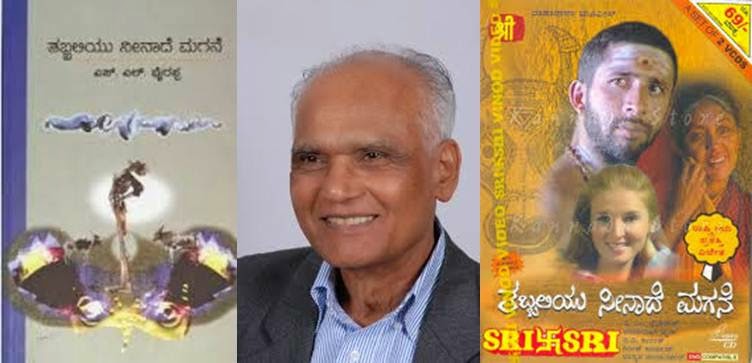'ಧರಣಿ
ಮಂಡಲ ಮಧ್ಯದೊಳಗೆ
ಮೆರೆಯುತಿಹ
ಕರ್ಣಾಟ ದೇಶದಿ'
ಪುಣ್ಯಕೋಟಿ
ಎಂಬ ಗೋವು ಇದ್ದ ದೊಡ್ಡಿಯ
ವಂಶಸ್ಥನಾದ ಕಾಳಿಂಗಗೌಡನೊಂದಿಗೆ ಶುರುವಾಗುವ ಈ ಕಾದಂಬರಿ ಅವನ
ಮೊಮ್ಮಗನಾದ ಕಾಳಿಂಗ (ಅಜ್ಜನ ಹೆಸರು ಮೊಮ್ಮಗನಿಗೆ ಇಡುವುದು ಆ ವಂಶದ ವಾಡಿಕೆ)
ನೊಂದಿಗೆ ಕೊನೆಗೊಳ್ಳುತ್ತದೆ.
ಕಾಳಿಂಗಗೌಡ
ಹಾಲಿನ ಆಸೆಗಾಗಿ ಗೋವನ್ನು ಸಾಕಿದವನಲ್ಲ. ಮನುಷ್ಯ ತಾಯಿಗಿಂತ ಗೋಮಾತೆಯ ಪುಣ್ಯ ದೊಡ್ಡದು ಎನ್ನುವುದು ಅವನ ಅಚಲ ನಂಬಿಕೆ.
ತನ್ನ ದೊಡ್ಡಿಯಲ್ಲಿರುವ ಎಲ್ಲ ಹಸುಗಳಿಗೂ ಅವನು
'ಗಂಗೆ', 'ಗೌರಿ' ಎಂದು ದೇವತೆಗಳ ಹೆಸರು
ಹಿಡಿದೇ ಕರೆಯುತ್ತಾನೆ. ಅದರಲ್ಲೂ ಪುಣ್ಯಕೋಟಿ ತಳಿಯ ಬಗ್ಗೆ ಗೌಡನಿಗೆ
ಎಲ್ಲಿಲ್ಲದ ವಿಶ್ವಾಸ. ಅವನ ಮೊಮ್ಮಗ ಇನ್ನೂಕೂಸಾಗಿರುವಾಗ,
ತಾಯಿಯ ಎದೆ ಹಾಲು ಸಾಲದಾಗಿ, ಈ
ಪುಣ್ಯಕೋಟಿ ಹಾಲು ಕುಡಿದೆ ದೊಡ್ಡವನಾಗಿದ್ದು.
ಕಾಡಿಗೆ ಹಸು ಮೇಯಿಸಲು ಹೋದಾಗ
ಅಲ್ಲಿ ಪುಣ್ಯಕೋಟಿ ಮೇಲೆ
ಎರಗಿದ ಕಿರುಬನ ಜೊತೆ ಕಾಳಗದಲ್ಲಿ ಮಡಿದ
ಮಗ ಕೃಷ್ಣನನ್ನು ಮತ್ತು ಕೆಲವೇ ದಿನಗಳಿಗೆ ಮಡಿದ ಪುಣ್ಯಕೋಟಿ ಹಸುವನ್ನು
ಅಕ್ಕ ಪಕ್ಕದಲ್ಲೇ ಮಣ್ಣು ಮಾಡಿ ತನ್ನ ಸಂಸ್ಕಾರ
ಮೆರೆದಿದ್ದ ಕಾಳಿಂಗಗೌಡ. ಅಲ್ಲದೆ ಪುಣ್ಯಕೋಟಿ ಹಾಡಿನಲ್ಲಿ ಬರುವ ಹಸು ಹೆಬ್ಬುಲಿಯನ್ನು
ಪರಿವರ್ತಿಸಿದ ಜಾಗವಾದ ಅರುಣಾದ್ರಿ ಬೆಟ್ಟದಲ್ಲಿ ಒಂದು ದೇವಸ್ಥಾನ ಮತ್ತು
ಕಲ್ಯಾಣಿಯನ್ನು ಕಟ್ಟಿ ತನ್ನ ಅಭಿಮಾನ ವ್ಯಕ್ತಗೊಳಿಸಿದ್ದ.
ಅವನ ಮೊಮ್ಮಗ ಕಾಳಿಂಗ ತನ್ನ ವಂಶದಲ್ಲೇ ಮೊದಲ ಬಾರಿಗೆ ಶಾಲೆಯ ಮೆಟ್ಟಿಲು ಹತ್ತಿ, ಹೈ ಸ್ಕೂಲು, ಕಾಲೇಜು ಪಾಸಾಗಿ, ಇಂಗ್ಲೀಷು ಕಲಿತು, ವಿದೇಶಕ್ಕೆ ಹೆಚ್ಚಿನ ಅಭ್ಯಾಸಕ್ಕೆ ತೆರಳಿದ್ದ. ಅಜ್ಜಿಯ ತಿಥಿಗೆ ವಾಪಸ್ಸು ಮರಳಿದ ಕಾಳಿಂಗನಿಗೆ, ಅಜ್ಜ ಎಲ್ಲೆಂದು ಕೇಳಿದಾಗ, ಅಜ್ಜಿಯ ತಿಥಿ ಮುಗಿದು ಹೋಗಿ, ನಂತರ ಕಾಲವಾದ ಅಜ್ಜನ ತಿಥಿಗೆ ಎಲ್ಲರು ಅಣಿಯಾಗುತ್ತಿರುವುದು ತಿಳಿಯಿತು. ಅಲ್ಲಿಂದ ಅಜ್ಜನ ಎಲ್ಲ ಆಸ್ತಿಯ ಹೊಣೆಗಾರಿಕೆ ಅವನ ಹೆಗಲೇರಿತು. ತನ್ನ ಸ್ನೇಹಿತ ಮತ್ತು ಅವನ ಅಜ್ಜ ಕಟ್ಟಿಸಿದ ದೇವಸ್ಥಾನದ ಅರ್ಚಕನಾದ ವೆಂಕಟರಮಣನಿಂದ ತನ್ನ ಕುಟುಂಬಕ್ಕೆ ಸಂಬಂಧಿಸಿದ ವಿಷಯಗಳನ್ನು ಕೇಳಿ ತಿಳಿದುಕೊಂಡ.
ಆಧುನಿಕ
ವಿಚಾರಗಳನ್ನು ಮೈಗೂಡಿಸಿ ಕೊಂಡಿದ್ದ ಕಾಳಿಂಗನ ವಿಚಾರಗಳು ಅವನ ಅಜ್ಜನವಕ್ಕಿಂತ ಸಂಪೂರ್ಣ
ವಿಭಿನ್ನವಾಗಿದ್ದವು. ಹಸು
ಒಂದು ಹಾಲು ಕೊಡುವ ಪ್ರಾಣಿ
ಮತ್ತು ಅದು ಹಾಲು ಕೊಡುವುದು
ನಿಲ್ಲಿಸಿದಾಗ ಅದನ್ನು ಮಾಂಸಕ್ಕೆ ಉಪಯೋಗಿಸುವುದು ಸೂಕ್ತ ಎನ್ನುವುದು ಅವನ ಅಭಿಪ್ರಾಯ. ಹಾಗಾಗಿಯೇ
ಅವನು ತನ್ನ ದೊಡ್ಡಿಯಲ್ಲಿದ್ದ ಗೊಡ್ಡು
ಹಸುಗಳನ್ನು ಮಾರಿ ಹಾಕಿದ. ಅಜ್ಜ
ದೇವಸ್ಥಾನಕ್ಕೆಂದು ಕಲ್ಯಾಣಿ ಕಟ್ಟಿಸಿದ್ದರೂ, ಅದಕೆ ಪಂಪ್ ಜೋಡಿಸಿ
ತನ್ನ ಹೊಲಕ್ಕೆ ನೀರು ಬಿಟ್ಟುಕೊಂಡ. ಟ್ರ್ಯಾಕ್ಟರ್
ತರಿಸಿ ಹೊಗೆಸೊಪ್ಪು ಉಳುಮೆ ಮಾಡತೊಡಗಿದ. ಅಮೇರಿಕೆಯಿಂದ ತನ್ನ ಹೆಂಡತಿ ಮತ್ತು
ಮಗುವನ್ನು ಕರೆಸಿಕೊಂಡ. ತೋಟದಲ್ಲೇ ಮನೆ ಕಟ್ಟಿಕೊಂಡು ವಾಸ
ಮಾಡ ತೊಡಗಿದ. ಕಾಳಿಂಗನ ವರ್ತನೆ ಮತ್ತು ವಿಚಾರಗಳು ಅವನ ಮನೆಯವರಿಗೆ ಹಾಗೂ
ಹಳ್ಳಿಯವರಿಗೆ ದಿಗ್ಭ್ರಮೆ ತಂದವು. ಯಾವುದಕ್ಕೂ ಕಿವಿಗೊಡದ ಕಾಳಿಂಗ ಗೆಳೆಯ ವೆಂಕಟರಮಣನ ಮಾತುಗಳನ್ನು ಸಹ ಉಪೇಕ್ಷಿಸಿಸಿದ. ಇದೆಲ್ಲ
ಬೆಳವಣಿಗೆಗಳ ನಡುವೆ, ಬದಲಾದ ಮಗನ ನಡುವಳಿಕೆಯಿಂದ ಬೇಸತ್ತು,
ಕಾಳಿಂಗನ ತಾಯಿ ಉಳಿದ ಪುಣ್ಯಕೋಟಿ
ಹಸುಗಳನ್ನು ವೆಂಕಟರಮಣನಿಗೆ ದಾನ ಕೊಟ್ಟು ಜೀವ
ಬಿಟ್ಟಳು. ಅವಳ ಶವಸಂಸ್ಕಾರವನ್ನು ಊರಿನ
ಜನರೇ, ಕಾಳಿಂಗನಿಗಾಗಿ ಕಾಯದೆ, ಕರೆಯದೆ, ತಾವೇ ಮಾಡಿ ಮುಗಿಸಿದರು.
ಕಾಳಿಂಗನ ಹೆಂಡತಿ ಹಿಲ್ಡಾಳಿಗೆ ಸ್ಥಾನ ಕ್ಯಾನ್ಸರ್ ಎಂದು ಗೊತ್ತಾಯಿತು. ಎದೆ ಹಾಲು ಕುಡಿಯುವ ಅವನ ಪುಟ್ಟ ಮಗು ಬಾಟಲಿ ಹಾಲನ್ನು ನಿರಾಕರಿಸಿ ಸೊರಗಲಾರಂಭಿಸಿತು. ಆಗ ನೆನಪಾಗಿದ್ದು ತಾನು ಚಿಕ್ಕವನಾಗಿದ್ದಾಗ ಪುಣ್ಯಕೋಟಿ ಕೆಚ್ಚಲಿಗೆ ಬಾಯಿ ಹಾಕಿ ಹಾಲು ಕುಡಿದ ವಿಷಯ. ಅವನ ದೊಡ್ಡಿಯಲ್ಲಿ ಯಾವುದೇ ಪುಣ್ಯಕೋಟಿ ಹಸು ಉಳಿದಿರಲಿಲ್ಲ. ಅವನ ತಾಯಿ ತನ್ನ ಸಾವಿಗೆ ಮುಂಚೆ ಅವನ್ನೆಲ್ಲ ಅರ್ಚಕ ವೆಂಕಟರಮಣನಿಗೆ ದಾನ ಕೊಟ್ಟಿದ್ದಳು. ಕಾಳಿಂಗ ತನ್ನ ಗೆಳೆಯ ವೆಂಕಟರಮಣನ ಹತ್ತಿರ ಸಮಸ್ಯೆ ಹೇಳಿಕೊಂಡು ಒಂದು ಪುಣ್ಯಕೋಟಿ ಹಸುವನ್ನು ಕೆಲ ದಿನಗಳ ಮಟ್ಟಿಗಾದರೂ ಕೊಡುವಂತೆ ಬೇಡಿ ಕೊಳ್ಳುತ್ತಾನೆ. ವೆಂಕಟರಮಣ ಕಾಳಿಂಗನನ್ನು ಹೀಯಾಳಿಸಿದರೂ, ಒಂದು ಹಸುವನ್ನು ಅದನ್ನು ಯಾವುದೇ ಕಾರಣಕ್ಕೆ ಸಾಯಿಸಬಾರದು ಎನ್ನುವ ಕರಾರು ಹಾಕಿ ಕೊಡುತ್ತಾನೆ. ಕಾಳಿಂಗನ ಪುಟ್ಟ ಮಗು ಪುಣ್ಯಕೋಟಿ ಕೆಚ್ಚಲಿಗೆ ಬಾಯಿ ಹಾಕಿ ಹಾಲು ಕುಡಿಯಲು ಪ್ರಾರಂಭಿಸುತ್ತದೆ. ಅಲ್ಲಿಯರೆಗೆ ತನ್ನ ವರ್ತನೆಯಲ್ಲಾದ ಲೋಪ ದೋಷಗಳ ಅರಿವು ಕಾಳಿಂಗನಿಗಾಗುತ್ತದೆ. ಅವನು ಕೆಲವೇ ದಿನಗಳ ಹಿಂದೆ ಕಟುಕರಿಗೇ ಮಾರಿದ್ದ ದನಗಳನ್ನು ವಾಪಸ್ಸು ತರುವ ಉದ್ದೇಶದಿಂದ ಅವುಗಳನ್ನು ಹುಡುಕಿಕೊಂಡು ಮುಂಬೈ ತಲುಪುತ್ತಾನೆ. ಅಲ್ಲಿ ಬಯಲಲ್ಲಿರುವ ಸಾವಿರಾರು ದನಗಳಲ್ಲಿ ತನ್ನವು ಯಾವೆಂಬುದು ಗುರುತು ಸಿಗುವುದಿಲ್ಲ. ಮತ್ತು ಅವೆಲ್ಲ ತನ್ನವೇ ಎನ್ನುವ ಭಾವ ಬರುತ್ತದೆ. ಆದರೆ ಅವುಗಳನ್ನು ತಾನು ಉಳಿಸಲಾರದ ಅಸಹಾಯಕತೆ ಅವನರಿವಿಗೆ ಬರುತ್ತದೆ. ಇದ್ದಕ್ಕಿದ್ದ ಹಾಗೆ ತಾಯಿಯ ನೆನಪು ಬರುತ್ತದೆ ಮತ್ತು ಅವ್ವ ಸಾಯಬಾರದಾಗಿತ್ತು ಎನಿಸುತ್ತದೆ. ಅವನು ತಬ್ಬಲಿಯಾಗುವುದು ಅನಿವಾರ್ಯವಾಗಿತ್ತೋ ಎನ್ನುವ ವಿಷಯ ಅವನ ಗ್ರಹಿಕೆಗೆ ಸಿಕ್ಕದೆ ಹೋಗುತ್ತದೆ.
 Kalinga’s mother saddened by the behavior of her son
dies but the villagers perform the last rites keeping Kalinga out of the scene.
Kalinga learns about all this. Though he was pained by his mother’s death, he
is afraid of villagers insulting him if he went any near to them. He develops a
dilemma and starts thinking what steps of his went wrong. In a few days after
his mother’s death, Kalinga’s second child, a daughter is born and soon after
the delivery due to medical complications his wife is unable to feed breast
milk to the new born. The baby is starved as it refused to accept bottled milk
and reaches the verge of life and death and that is when Kalinga goes to Venkataramana
and begs him to lend him a cow to feed his baby and thus saves his child. That
incident brings clarity to the thoughts Kalinga had and he decides to save the
old cows his wife had sold to a butcher few days ago. Tracing them he reaches
Mumbai but fails identify his cows among thousands of cows in the butcher
house. All begin to appear like his cows but with the money he has he cannot
save all of them. Again he begins to retrospect his life.
Kalinga’s mother saddened by the behavior of her son
dies but the villagers perform the last rites keeping Kalinga out of the scene.
Kalinga learns about all this. Though he was pained by his mother’s death, he
is afraid of villagers insulting him if he went any near to them. He develops a
dilemma and starts thinking what steps of his went wrong. In a few days after
his mother’s death, Kalinga’s second child, a daughter is born and soon after
the delivery due to medical complications his wife is unable to feed breast
milk to the new born. The baby is starved as it refused to accept bottled milk
and reaches the verge of life and death and that is when Kalinga goes to Venkataramana
and begs him to lend him a cow to feed his baby and thus saves his child. That
incident brings clarity to the thoughts Kalinga had and he decides to save the
old cows his wife had sold to a butcher few days ago. Tracing them he reaches
Mumbai but fails identify his cows among thousands of cows in the butcher
house. All begin to appear like his cows but with the money he has he cannot
save all of them. Again he begins to retrospect his life.
No comments:
Post a Comment